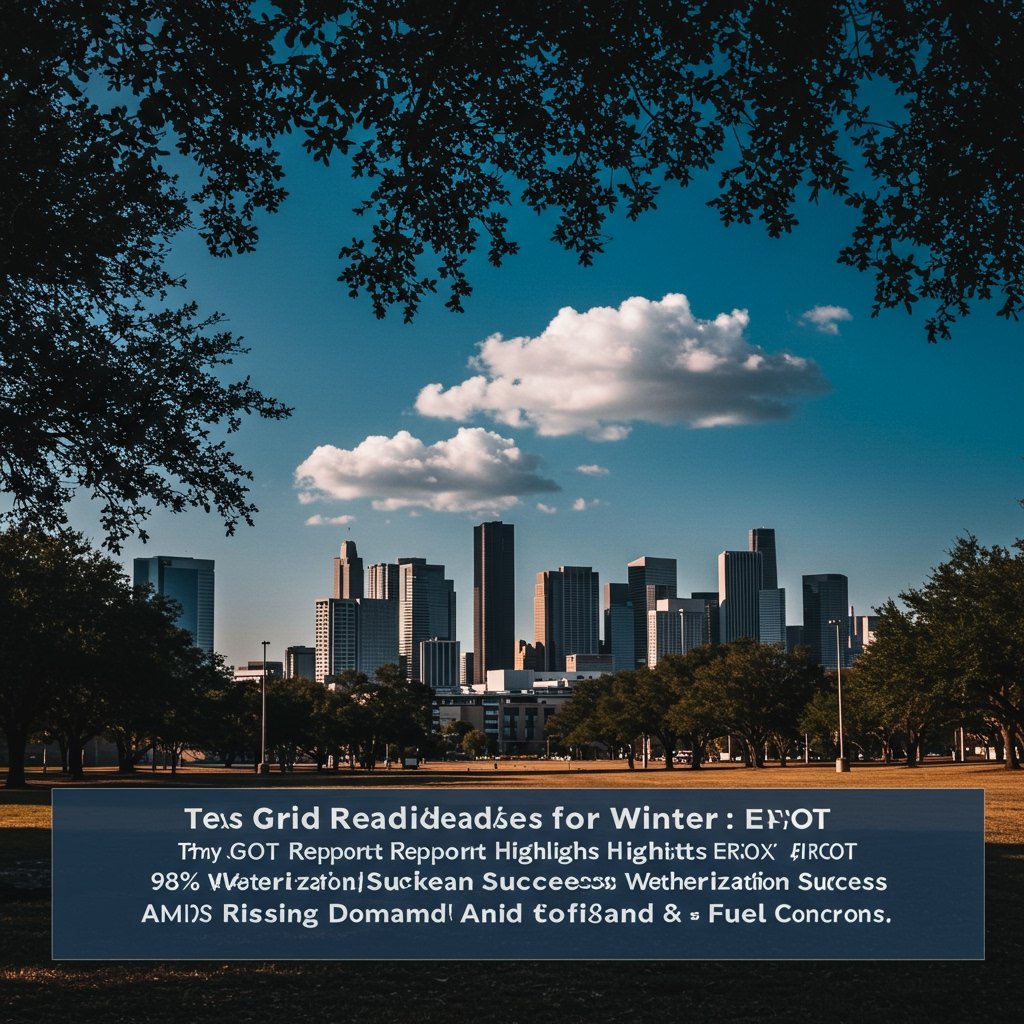ERCOT Releases Biennial Winter Preparedness Report
A critical assessment of the Texas grid’s readiness for potential cold weather events has been released by the Electric Reliability Council of Texas (ERCOT). Today, ERCOT published its biennial Winter Preparedness Report, a comprehensive document outlining the state of the grid ahead of the 2024-2025 winter season.
The report, a key part of ERCOT’s ongoing efforts to enhance grid reliability and resilience following lessons learned from past extreme weather events, was recently reviewed by the Texas House Energy Resources Committee. This review provides legislative oversight and highlights the importance placed on grid stability by state lawmakers.
Significant Gains in Generator Weatherization
One of the most positive takeaways from the ERCOT report is the significant progress made in generator weatherization compliance. Weatherization measures are crucial for protecting power generation facilities and equipment from the impacts of extreme cold, such as freezing pipes or instrument failures, which have historically led to plant outages during winter storms.
The report noted a high level of adherence to new weatherization standards, citing an impressive 98% pass rate on recent inspections conducted across the generation fleet within the ERCOT territory. This high compliance rate represents a substantial improvement compared to past years and reflects dedicated efforts by generators to meet regulatory requirements and invest in hardening their infrastructure against cold weather.
This near-universal compliance with weatherization standards is a direct result of enhanced regulations and increased focus on winter preparedness since the winter storm of February 2021. It underscores the industry’s commitment to improving physical resilience at generation sites, a vital component of overall grid reliability during cold snaps.
Persistent Challenges: Demand Growth and Fuel Supply Risks
Despite the notable success in weatherization, ERCOT’s report does not paint an entirely sanguine picture. It explicitly highlights areas where the Texas grid faces ongoing and potentially escalating risks as the 2024-2025 winter season approaches.
A primary concern is the record peak demand growth being experienced across the ERCOT service area. Texas is one of the fastest-growing states in the U.S., with booming population and economic activity driving up electricity consumption. ERCOT’s projections indicate that peak demand during extreme winter conditions continues to rise, placing increasing pressure on the available generation and transmission capacity. While new generation resources are being added to the grid, the pace of demand growth poses a significant challenge to maintaining adequate reserves during peak load periods.
Another critical risk factor identified in the report is the potential for fuel supply disruptions. The Texas grid relies heavily on natural gas-fired power plants, which require a continuous and reliable supply of fuel. Extreme cold weather can impact the natural gas infrastructure, including production wellheads, pipelines, and processing facilities, leading to supply interruptions that can prevent power plants from operating at full capacity or force them offline entirely. The report warns that despite coordination efforts, the interdependence of the electric grid and the natural gas supply chain remains a vulnerability that must be actively managed and mitigated.
Recommendations for Future Reliability
To address the identified risks and continue bolstering grid resilience, the ERCOT report puts forth key recommendations for policymakers and stakeholders.
The report urges the necessity of accelerated grid modernization investments. This includes investments not only in generation but also in transmission and distribution infrastructure, as well as advanced grid technologies like smart grid systems, energy storage, and enhanced forecasting capabilities. Modernization is seen as essential to efficiently manage growing demand, integrate diverse generation sources, and improve the grid’s ability to withstand and recover from extreme weather events.
Furthermore, ERCOT recommends exploring Dispatchable Reliability Credits, a concept that was proposed in Senate Bill 6 during the 2023 legislative session. This mechanism is intended to incentivize the development or retention of ‘dispatchable’ generation resources – power plants that can be called upon to provide electricity on demand, regardless of weather conditions (such as natural gas, coal, nuclear, or certain forms of energy storage). The exploration of such credits aims to ensure sufficient reliable capacity is available to meet peak demand, particularly during times when variable renewable resources like wind and solar may not be generating power.
Legislative Response and Call for Swift Action
The findings of the ERCOT report were met with serious consideration by the Texas House Energy Resources Committee. Committee Chair Rep. John Chen publicly acknowledged the report’s dual message of progress in weatherization alongside the enduring challenges posed by demand growth and fuel supply.
In response to the report’s findings and recommendations, Rep. Chen called for swift action from policymakers and industry stakeholders. Emphasizing the urgency, he stated that it is crucial to implement the necessary measures and recommendations ahead of the next winter season to further enhance grid reliability and ensure Texans have access to power during potential cold weather events.
Conclusion: Progress Made, Vigilance Required
In summary, ERCOT’s latest biennial Winter Preparedness Report highlights significant strides in improving the physical resilience of the Texas grid’s generation fleet, evidenced by the remarkable 98% pass rate on recent weatherization inspections. This achievement is a testament to focused efforts following past grid challenges. However, the report also serves as a critical reminder that substantial risks persist, driven by Texas’s rapid record peak demand growth and the inherent vulnerabilities in the fuel supply disruptions, particularly concerning natural gas.
The report’s recommendations for accelerated grid modernization investments and exploring Dispatchable Reliability Credits underscore the ongoing need for strategic planning and investment. With Committee Chair Rep. John Chen urging swift action, the focus now turns to implementing these measures to build upon the progress made and mitigate the remaining risks, ensuring the Texas grid is as prepared as possible for the 2024-2025 winter season and beyond.






